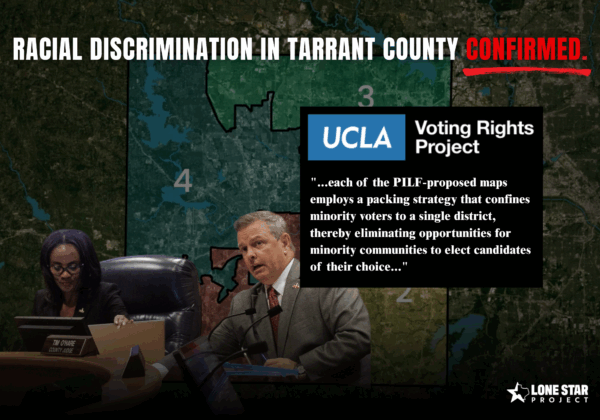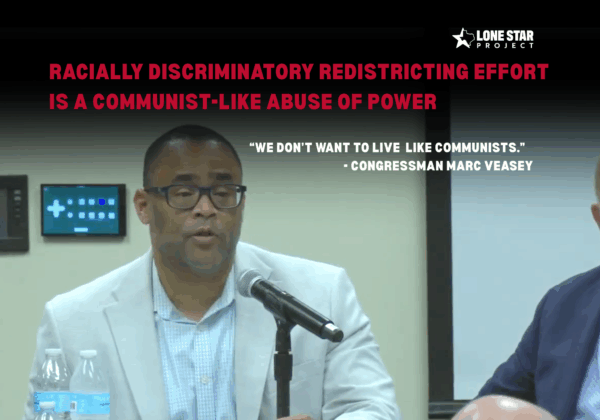Yesterday evening, the three-judge Federal District Court in San Antonio with jurisdiction over the long-pending Texas congressional redistricting case issued a 2 to 1 ruling that the congressional district map enacted by Texas Republican leaders in 2011 discriminates against Hispanic and African American Texans and was adopted with discriminatory intent.
The finding of discriminatory intent is especially important because it opens the possibility that the court will put Texas back under a pre-clearance review process requiring that maps drawn in the future be reviewed for constitutional and voting rights violations prior to being used in elections.
While the 2011 map was blocked for use in elections by earlier court rulings, many of its features, particularly in the Austin/South Texas/Border region, were retained in the current map and will have to be changed significantly by the Legislature or, if it doesn’t repair the violations, by the court itself after a remedy is ordered.
The court singled out violations in the Corpus Christi region involving District 27 (Farenthold – R), in the South Texas/Border region involving District 23 (Hurd – R) and in the Austin to San Antonio region involving District 35 (Doggett – D). The Court also ruled that minority voters in the Dallas/Fort Worth area were illegally cracked under the 2011 map.
While it is too early to know exactly what changes will be made, it is fair to read the opinion as requiring that Hispanic voters put into Anglo-controlled CD27 in the current map must be returned to an effective Hispanic district, that Hispanic voting strength weakened in District 23 must be restored, and that District 35 in the Austin to San Antonio corridor will have to be modified to reunite minority voters in a far less fragmented district centered in Austin.
In Dallas/Fort Worth, the creation of District 33 (Veasey – D) in the current map may have resolved some of the blatant violations under the 2011 map; however, arguments will be made to repair remaining cracked Hispanic and African American neighborhoods in Dallas and Tarrant counties.
The ruling is a major victory for minority citizens and their advocates before the court. Minority advocacy groups including LULAC, NAACP, the Mexican American Legislative Caucus and citizen plaintiff groups led by Congressman Marc Veasey and State Representative Eddie Rodriguez had the courage to challenge the GOP map and the tenacity to stay with a long and difficult court battle. Their efforts have defended and protected the voting rights of thousands of otherwise disenfranchised Texas citizens. The Lone Star Project has been engaged in the Texas redistricting battle from the onset and will continue to provide support to key plaintiffs in this important effort.
We should expect the San Antonio Court to schedule a hearing soon to discuss the additional deliberations needed to fully resolve the case and to reach a final remedy. It is also likely that Governor Greg Abbott will refuse give up Texas GOP efforts to protect a discriminatory redistricting process and will direct state attorneys to explore appeal options.
The finding of discriminatory intent is especially important because it opens the possibility that the court will put Texas back under a pre-clearance review process requiring that maps drawn in the future be reviewed for constitutional and voting rights violations prior to being used in elections.
While the 2011 map was blocked for use in elections by earlier court rulings, many of its features, particularly in the Austin/South Texas/Border region, were retained in the current map and will have to be changed significantly by the Legislature or, if it doesn’t repair the violations, by the court itself after a remedy is ordered.
The court singled out violations in the Corpus Christi region involving District 27 (Farenthold – R), in the South Texas/Border region involving District 23 (Hurd – R) and in the Austin to San Antonio region involving District 35 (Doggett – D). The Court also ruled that minority voters in the Dallas/Fort Worth area were illegally cracked under the 2011 map.
While it is too early to know exactly what changes will be made, it is fair to read the opinion as requiring that Hispanic voters put into Anglo-controlled CD27 in the current map must be returned to an effective Hispanic district, that Hispanic voting strength weakened in District 23 must be restored, and that District 35 in the Austin to San Antonio corridor will have to be modified to reunite minority voters in a far less fragmented district centered in Austin.
In Dallas/Fort Worth, the creation of District 33 (Veasey – D) in the current map may have resolved some of the blatant violations under the 2011 map; however, arguments will be made to repair remaining cracked Hispanic and African American neighborhoods in Dallas and Tarrant counties.
The ruling is a major victory for minority citizens and their advocates before the court. Minority advocacy groups including LULAC, NAACP, the Mexican American Legislative Caucus and citizen plaintiff groups led by Congressman Marc Veasey and State Representative Eddie Rodriguez had the courage to challenge the GOP map and the tenacity to stay with a long and difficult court battle. Their efforts have defended and protected the voting rights of thousands of otherwise disenfranchised Texas citizens. The Lone Star Project has been engaged in the Texas redistricting battle from the onset and will continue to provide support to key plaintiffs in this important effort.
We should expect the San Antonio Court to schedule a hearing soon to discuss the additional deliberations needed to fully resolve the case and to reach a final remedy. It is also likely that Governor Greg Abbott will refuse give up Texas GOP efforts to protect a discriminatory redistricting process and will direct state attorneys to explore appeal options.


